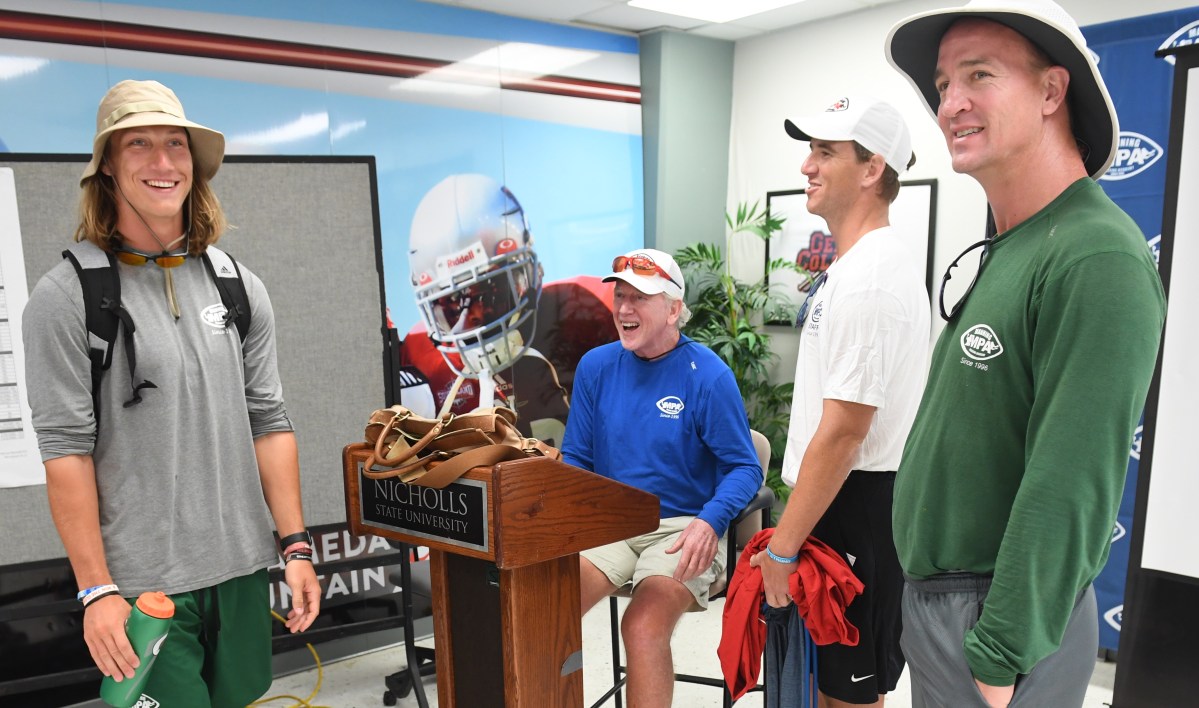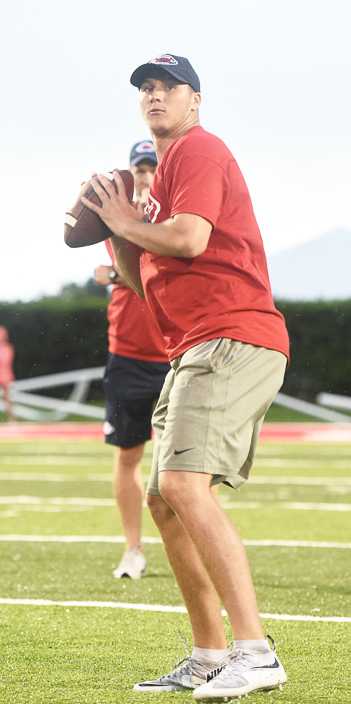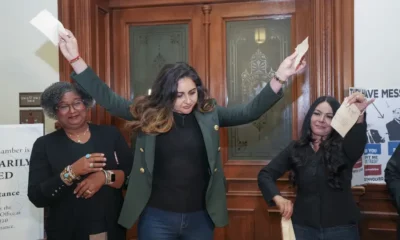Mississippi Today
All 8 remaining playoff quarterbacks came through Manning academy
All 8 remaining playoff quarterbacks came through Manning academy

Question: What do all eight starting quarterbacks remaining in the NFL playoffs have in common, other than an intense spotlight shining on them this weekend?
Answer: While still in college, all eight worked as counselors in the Manning Passing Academy (MPA) in Thibodaux, La. Count ’em, eight: Dak Prescott, Dallas Cowboys; Trevor Lawrence, Jacksonville Jaguars; Jalen Hurts, Philadelphia Eagles; Brock Purdy, San Francisco 49ers; Daniel Jones, New York Giants; Joe Burrow, Cincinnati Bengals; Patrick Mahomes, Kansas City Chiefs; and Josh Allen Buffalo Bills.
Several of those, including Dak Prescott, were Manning campers before they became counselors later on.

“We’d love to take credit for all their success, but they were pretty good when we got them,” Archie Manning told Mississippi Today on Tuesday. Archie Manning and his sons Cooper, Peyton and Eli are all deeply involved in the camp, which is already sold out with a long waiting list for 2023.
Besides the eight quarterbacks, Kellen Moore, the coach who will call the Cowboys’ plays for Prescott, worked as an MPA counselor when he played at Boise State. Cincinnati Bengals head coach Zac Taylor was an MPA counselor in 2006 when he played at Nebraska.
What’s more, three of the four quarterbacks whose teams lost in the playoffs last weekend were also MPA counselors. The only outlier? Tom Brady.
Deadpanned Cooper Manning, “Tom just wasn’t good enough.”
The 26-year-old MPA welcomes approximately 1,200 campers each summer for four days of intensive instruction. Over the years, thousands of those campers have been Mississippians.
“We like to keep the coach/camper ratio at 10 to 1,” Archie Manning said. “So our coaching staff consists roughly of about 80 high school and college coaches and then about 40 counselors who are college quarterbacks.”
Many of the college quarterbacks, including Prescott, attended MPA multiple years. Philadelphia Eagles quarterback Jalen Hurts, a prime candidate for NFL MVP, was a three-year counselor, including two times when he was at Alabama and once when he was at Oklahoma.

“The portal has really changed things,” Archie Manning said. “When I was sending out invitations for our return counselors, 11 of 21 had changed schools.”
Asked if any of the counselor-turned-playoffs quarterbacks have surprised him, Archie Manning didn’t have to think long to answer. “It would have to be Brock Purdy,” Manning said. “I mean, my gosh, from last pick in the draft to doing what he’s doing right now in San Francisco. I knew he was pretty good, but this is something like Ole Miss getting the last bid to the NCAA Tournament and then going on to win the national championship.”
That’s exactly what happened with Ole Miss baseball last year. And Purdy, a rookie out of Iowa State, has quarterbacked the San Francisco 49ers to six straight victories since becoming a starter, throwing 16 touchdowns, just four interceptions. Purdy was a third string rookie before injuries to the top two 49ers quarterbacks elevated him to a starting role.
So, how did an Iowa State quarterback end up at a football camp in Thibodaux, La.? “I was flipping channels one Saturday and started watching an Iowa State game,” Archie Manning answered. “I just loved the way Brock played and made a note to invite him to the camp.”
Purdy accepted, as nearly all do. It has become almost like a badge of honor for college quarterbacks to be invited to be an MPA counselor.
Archie Manning says he stays in touch with all “our guys,” primarily with text messaging. “I congratulate them when they do well, and probably send as many or more notes when they have a bad game,” he said. “That’s the thing with quarterbacks. You’re going to have bad games. That’s the nature of it. You’re going to throw interceptions, and not all them will be your fault. Look at Dak in the last game of the regular season. I was so proud of him the way he came back in the playoffs Monday night.”
Prescott, Manning said, is one of his favorite quarterbacks to come through MPA. “Love Dak,” he said. “Love the way he plays, love his toughness, love the way he handles himself. Love everything about him.”
That doesn’t mean Archie and son Eli weren’t above playing a joke on Dak during one summer camp. “Papa John’s made us these bright red T-shirts for our counselors one year,” Archie Manning said. “Eli and I took the one for Dak and added some stripes to it and made it look like an Ole Miss game jersey.”
Prescott wore it – after removing the stripes.

Archie Manning recalls watching Trevor Lawrence in person for the first time at the MPA in 2019 when Lawrence was Clemson’s star quarterback. “What I remember is watching Trevor work out and throw and thinking, ‘This is what God drew up when he decided to make a perfect quarterback.’”

Cincinnati Bengals quarterback Joe Burrow was invited to MPA in the summer of 2019 just before his breakout National Championship season at LSU. Archie Manning also invited Amory native Jimmy Burrow, a college coach and Joe’s dad, to the camp that year.
“Jimmy wrote me a note the next week and told me how much they enjoyed it,” Archie Manning said. “He told me Joe told him on the way home that he believed he was the best quarterback at camp and he probably was. Joe has never lacked for confidence.”
“What I remember most about Joe, besides how good he was, was how his hair and his sunglasses had to be perfect,” Cooper Manning said. “Joe was always stylin’. Still is.”
One of the annual highlights of the camp is a Friday night throwing competition among the counselors. In 2017, the competition was delayed by a heavy rainstorm.

“Usually, in Thibodaux, when it rains like that there’s lots of lightning and they have to come off the field,” Archie Manning said. “That day, Josh Allen (then of Wyoming, now the Buffalo Bills) comes up to me in the locker room and says, ‘Mr. Manning, it’s not lightning. Let’s go out there and do this.’ Josh is so competitive. He couldn’t wait.
“So we go out there and it’s wet as can be, and I’ll never forget it. It’s hard to throw a wet ball because it gets slick and heavy, but Josh threw that thing like it was perfectly dry. I turned to Peyton and said, ‘Can you believe this guy?’ Peyton couldn’t believe it either. Never seen anybody throw a wet football like that.I always said Matt Stafford had the strongest arm I had ever seen, but then I saw Josh Allen throw it. Unbelievable.”
Cooper Manning concurs. “It was raining like crazy. Everything was soaked and wet. And there’s Josh, slinging it 80 yards.”
Of course, throwing at targets in shorts and t-shirts is not a good predictor or how someone will throw the football when the blitz is coming and huge, angry people are coming at you intent on rearranging your body parts.
Patrick Mahomes would be Exhibit A.
“I remember when Mahomes came,” Archie Manning said. “In the competition he was like just another guy. There were several who could throw it as well or better. When Pat really impresses is when he’s throwing on the move, improvising, extending plays. Nobody does it better. He just makes plays.”
Nine-time Pro Bowler Russell Wilson is another who attended MPA both as a camper and then a counselor. Wilson didn’t make the playoffs this year with the Denver Broncos, but Archie Manning well remembers when Wilson and the Seattle Seahawks trounced the Broncos and Peyton Manning in the 2014 Super Bowl. In fact, Archie remembers watching a mid-Super Bowl week TV interview with Wilson. “Russell was wearing a Manning Passing Academy t-shirt there at the Super Bowl,” Archie said. “That blew me away.”
Said Cooper Manning, “It has gotten to be almost like a fraternity, the guys who have been through MPA and are now some of the biggest stars in the sport. We’re proud of it, and we don’t take it for granted.”
This article first appeared on Mississippi Today and is republished here under a Creative Commons license.
Mississippi Today
Mississippi Gulf Coast commemorates two decades since Hurricane Katrina
GULFPORT — A Hurricane Hunter flyby Friday opened the 20th anniversary ceremony of Hurricane Katrina at the Barksdale Pavilion in Gulfport, filled with hundreds of people who each has a story of where they were on Aug. 29, 2005, and how Katrina changed their lives.
It ended about 90 minutes later with the young choir from St. James Catholic Church in Gulfport joining songwriter Steve Azar in an energetic rendition of “One Mississippi,” the state song.
It was as if the ceremony and the many photographs and memories brought out and examined this week ripped off the bandage to the pain of Katrina and the loss of 238 people.
Here are the five most memorable quotes of the day from Gulfport:
“We’re so blessed. We’re so fortunate,” said Gulfport Mayor Hugh Keating, whose home was flooded with 8 feet of water during Katrina. “We survived, and we thrived,” he said of south Mississippi.
He and all the speakers saluted the volunteers who came from across the country and even the world to help with the recovery — “960,000. I had no idea there was that many,” Keating said.
The speaker’s platform, set up where the storm surge rushed in to devastate Gulfport, is close to the Mississippi Aquarium and Island View Casino, which opened since the storm. The State Port of Gulfport was rebuilt and the downtown is revitalized, with a lively restaurant scene and offices.
“We coined a new word after Katrina — ‘slabbed,’” said Haley Barbour, who was governor at the time Katrina struck. From Waveland, where after the devastating storm surge “every structure was destroyed,” he said, to Pascagoula, 80 miles away from the center and still with so many homes lost, “It looked like the hand of God had wiped away the Coast — utter destruction,” he said.
The audience gave Barbour and his wife, Marsha, standing ovations. She was at Camp Shelby in Hattiesburg the day before Katrina and “came down with the troops,” her husband said. She was on the Coast, making sure needs were met, for months.
“We are always better together,” said Tulsi Gabbard, U.S. director of national intelligence, who greeted the crowd with an “Aloha.” Listening to the stories from Katrina on the 20th anniversary reminded her of the fires that destroyed Lahaina on Maui in her native state of Hawaii, she said, when 102 people died and the area was left with total devastation.
We will always remember those lost, she said, “But my hope is that we remain inspired, as we stand here 20 years later, by what came after, and remember the unity that we felt, remember the strength that came from all of us coming together as neighbors, as friends, as colleagues, as Americans, that allowed us to get through these historic disasters.”
“Together, we proved you should never bet against Mississippi,” said Gov. Tate Reeves. At the time, Katrina was five times the size of any natural disaster to hit the United States, he said.
People returned home to find nothing but “steps to nowhere,” every other trace of their home gone. Their churches, schools and offices also were damaged and destroyed.
Sen. Trent Lott and Sen. Thad Cochran fought for federal funds, working with state officials and Gov. Barbour to bring south Mississippi back, he said. “Everyone knew who was in charge, and that was Gov. Barbour,” he said. “He never once wavered. He never once quit.”
If Mississippi only built the Coast back to what it was, the state would have failed, was Barbour’s mantra after Katrina and the vision for south Mississippi today. The priorities initially were homes, jobs and schools, and in the 20 years since, south Mississippi has seen great business growth.
“Hurricane roulette,” is how Lt. Gov. Delbert Hosemann terms it. “Sooner or later it will be our time,” he said, but Mississippi is better prepared than it was for Katrina. Homes and offices were built back stronger and, “We have money set aside in the state,” he said. Mississippi has $1 billion in the windpool between cash and reinsurance for another major storm that one day will come.
This article first appeared on Mississippi Today and is republished here under a Creative Commons Attribution-NoDerivatives 4.0 International License.
The post Mississippi Gulf Coast commemorates two decades since Hurricane Katrina appeared first on mississippitoday.org
Note: The following A.I. based commentary is not part of the original article, reproduced above, but is offered in the hopes that it will promote greater media literacy and critical thinking, by making any potential bias more visible to the reader –Staff Editor.
Political Bias Rating: Center-Right
This article presents a respectful and largely positive reflection on the recovery efforts following Hurricane Katrina, highlighting leadership from Republican figures such as former Governor Haley Barbour and current Governor Tate Reeves. The tone emphasizes resilience, unity, and effective governance, with no overt criticism of political actors or policies. The inclusion of Tulsi Gabbard, a figure with a complex political background, is framed in a unifying and nonpartisan manner. Overall, the content leans slightly toward a center-right perspective by focusing on conservative leadership and state-led recovery success without engaging in partisan debate.
Mississippi Today
Two Mississippi media companies appeal Supreme Court ruling on sealed court files
A three-judge panel of the Mississippi Supreme Court has ruled that court records in a politically charged business dispute will remain confidential, even though courts are supposed to be open to the public.
The panel, comprised of Justice Josiah Coleman, Justice James Maxwell and Justice Robert Chamberlin, denied a request from Mississippi Today and the Sun Herald that sought to force Chancery Judge Neil Harris to unseal court records in a Jackson County Chancery Court case or conduct a hearing on unsealing the court records.
The Supreme Court panel did not address whether Harris erred by sealing court records and it has not forced the judge to comply with the court’s prior landmark decisions detailing how judges are allowed to seal court records in extraordinary circumstances.
The case in question has drawn a great deal of public interest. The lawsuit seeks to dissolve a company called Securix Mississippi LLC that used traffic cameras to ticket uninsured motorists in numerous cities in the state.
The uninsured motorist venture has since been disbanded and is the subject of two federal lawsuits, neither of which are under seal. In one federal case, an attorney said the chancery court file was sealed to protect the political reputations of the people involved.
READ MORE: Private business ticketed uninsured Mississippi vehicle owners. Then the program blew up.
Quinton Dickerson and Josh Gregory, two of the leaders of QJR, are the owners of Frontier Strategies. Frontier is a consulting firm that has advised numerous elected officials, including four sitting Supreme Court justices. The three justices who considered the media’s motion for relief were not clients of Frontier.
The two news outlets on Thursday filed a motion asking the Supreme Court for a rehearing.
Courts are open to public
In their motion for a rehearing, the media companies are asking that the Supreme Court send the case back to chancery court, where Harris should be required to give notice and hold a hearing to discuss unsealing the remaining court files.
Courts and court files are supposed to be open and accessible to the public. The Supreme Court has, since 1990, followed a ruling that lays out a procedure judges are supposed to follow before closing any part of a court file. The judge is supposed to give 24 hours notice, then hold a hearing that gives the public, including the media, an opportunity to object.
At the hearing, the judge must consider alternatives to closure and state any reasons for sealing records.
Instead, Harris closed the court record without explanation the same day the case was filed in September 2024. In June, Harris denied a motion from Mississippi Today to unseal the file.
The case, he wrote in his order, is between two private companies. “There are no public entities included as parties,” he wrote, “and there are no public funds at issue. Other than curiosity regarding issues between private parties, there is no public interest involved.”
But that is at least partially incorrect. The case involves Securix Mississippi working with city police departments to ticket uninsured motorists. The Mississippi Department of Public Safety had signed off on the program and was supposed to be receiving a share of the revenue.
Mississippi Today and the Sun Herald then filed for relief with the state Supreme Court, arguing that Harris improperly closed the court file without notice and did not conduct a hearing to consider alternatives.
After the media outlets’ appeal to the Supreme Court, Harris ordered some of the records in the case to be unsealed.
But he left an unknown number of exhibits under seal, saying they contain “financial information” and are being held in a folder in the Chancery Clerk’s Office.
File improperly sealed, media argues
The three-judge Supreme Court panel determined the media appeal was no longer relevant because Harris had partially unsealed the court file.
In the news outlets’ appeal for rehearing, they argue that if the Supreme Court does not grant the motion, the state’s highest court would virtually give the press and public no recourse to push back on judges when they question whether court records were improperly sealed.
“The original … sealing of the entire file violated several rights of the public and press … which if not overruled will be capable of repetition yet, evading review,” the motion reads.
The media companies also argue that Harris’ order partially unsealing the chancery court case was not part of the record on appeal and should not have been considered by the Supreme Court. His order to partially unseal the case came 10 days after Mississippi Today and the Sun Herald filed their appeal to the Supreme Court.
READ MORE: Judge holds secret hearing in business fight over uninsured motorist enforcement
Charlie Mitchell, a lawyer and former newspaper editor who has taught media law at the University of Mississippi for years, called Judge Harris’ initial order keeping the case sealed “illogical.” He said the judge’s second order partially unsealing the case appears “much closer” to meeting the court’s standard for keeping records sealed, but the judge could still be more specific and transparent in his orders.
Instead of simply labeling the sealed records as “financial information,” Mitchell said the Supreme Court could promote transparency in the judiciary by ordering Harris to conduct a hearing — something he should have done from the outset — or redact portions of the exhibits.
“Closing a record or court matter as the preference of the parties is never — repeat never — appropriate,” Mitchell said. “It sounds harsh, but if parties don’t want the public to know about their disputes, they should resolve their differences, as most do, without filing anything in a state or federal court.”
This article first appeared on Mississippi Today and is republished here under a Creative Commons Attribution-NoDerivatives 4.0 International License.
The post Two Mississippi media companies appeal Supreme Court ruling on sealed court files appeared first on mississippitoday.org
Note: The following A.I. based commentary is not part of the original article, reproduced above, but is offered in the hopes that it will promote greater media literacy and critical thinking, by making any potential bias more visible to the reader –Staff Editor.
Political Bias Rating: Center-Left
The content focuses on transparency, accountability, and the public’s right to access court records, which aligns with values often emphasized by center-left perspectives. It critiques the sealing of court documents and advocates for media and public oversight of judicial processes, reflecting a concern for government openness and checks on power. However, the article maintains a factual tone without overt political partisanship, situating it slightly left of center due to its emphasis on transparency and media rights.
Mississippi Today
Judge: Felony disenfranchisement a factor in ruling on Mississippi Supreme Court districts
The large number of Mississippians with voting rights stripped for life because they committed a disenfranchising felony was a significant factor in a federal judge determining that current state Supreme Court districts dilute Black voting strength.
U.S. District Judge Sharion Aycock, who was appointed to the federal bench by George W. Bush, last week ruled that Mississippi’s Supreme Court districts violate the federal Voting Rights Act and that the state cannot use the same maps in future elections.
Mississippi law establishes three Supreme Court districts, commonly referred to as the northern, central and southern districts. Voters elect three judges from each to the nine-member court. These districts have not been redrawn since 1987.
READ MORE: Mississippians ask U.S. Supreme court to strike state’s Jim Crow-era felony voting ban
The main district at issue in the case is the central district, which comprises many parts of the majority-Black Delta and the majority-Black Jackson Metro Area.
Several civil rights legal organizations filed a lawsuit on behalf of Black citizens, candidates, and elected officials, arguing that the central district does not provide Black voters with a realistic chance to elect a candidate of their choice.
The state defended the districts arguing the map allows a fair chance for Black candidates. Aycock sided with the plaintiffs and is allowing the Legislature to redraw the districts.
The attorney general’s office could appeal the ruling to the U.S. 5th Circuit Court of Appeals. A spokesperson for the office stated that the office is reviewing Aycock’s decision, but did not confirm whether the office plans to appeal.
In her ruling, Aycock cited the testimony of William Cooper, the plaintiff’s demographic and redistricting expert, who estimated that 56,000 felons were unable to vote statewide based on a review of court records from 1994 to 2017. He estimated 60% of those were determined to be Black Mississippians.
Cooper testified that the high number of people who were disenfranchised contributed to the Black voting age population falling below 50% in the central district.
Attorneys from Attorney General Lynn Fitch’s office defended the state. They disputed Cooper’s calculations, but Aycock rejected their arguments.
The AG’s office also said Aycock should not put much weight on the number of disenfranchised people because the U.S. Fifth Circuit Court of Appeals previously ruled that Mississippi’s disenfranchisement system doesn’t violate the Equal Protection Clause of the 14th Amendment.
Aycock, however, distinguished between the appellate court’s ruling that the system did not have racial discriminatory intent and the current issue of the practice having a racially discriminatory impact.
“Notably, though, that decision addressed only whether there was discriminatory intent as required to prove an Equal Protection claim,” Aycock wrote. “The Fifth Circuit did not conclude that Mississippi’s felon disenfranchisement laws have no racially disparate impact.”
Mississippi has one of the harshest disenfranchisement systems in the nation and a convoluted method for restoring voting rights to people.
Other than receiving a pardon from the governor, the only way for someone to regain their voting rights is if two-thirds of legislators from both chambers at the Capitol, the highest threshold in the Legislature, agree to restore their suffrage.
Lawmakers only consider about a dozen or so suffrage restoration bills during the session, and they’re typically among the last items lawmakers take up before they adjourn for the year.
Under the Mississippi Constitution, people convicted of a list of 10 types of felonies lose their voting rights for life. Opinions from the Mississippi Attorney General’s Office have since expanded the list of specific disenfranchising felonies to 23.
The practice of stripping voting rights away from people for life is a holdover from the Jim Crow era. The framers of the 1890 Mississippi Constitution believed Black people were most likely to commit certain crimes.
Leaders in the state House have attempted to overhaul the system, but none have gained any significant traction in both chambers at the Capitol.
Last year, House Constitution Chairman Price Wallace, a Republican from Mendenhall, advocated a constitutional amendment that would have removed nonviolent offenses from the list of disenfranchising felonies, but he never brought it up for a vote in the House.
Wallace and House Elections Chairman Noah Sanford, a Republican from Collins, are leading a study committee on Sept. 11 to explore reforms to the felony suffrage system and other voting legislation.
Wallace previously said on an episode of Mississippi Today’s “The Other Side” podcast that he believes the state should tackle the issue because one of his core values, part of his upbringing, is giving people a second chance, especially once they’ve made up for a mistake.
“This issue is not a Republican or Democratic issue,” Wallace said. “It allows a woman or a man, whatever the case may be, the opportunity to have their voice heard in their local elections. Like I said, they’re out there working. They’re paying taxes just like you and me. And yet they can’t have a decision in who represents them in their local government.”
This article first appeared on Mississippi Today and is republished here under a Creative Commons Attribution-NoDerivatives 4.0 International License.
The post Judge: Felony disenfranchisement a factor in ruling on Mississippi Supreme Court districts appeared first on mississippitoday.org
Note: The following A.I. based commentary is not part of the original article, reproduced above, but is offered in the hopes that it will promote greater media literacy and critical thinking, by making any potential bias more visible to the reader –Staff Editor.
Political Bias Rating: Center-Left
This article presents a focus on voting rights and racial justice issues, highlighting the impact of felony disenfranchisement on Black voters in Mississippi. It emphasizes civil rights concerns and critiques longstanding policies rooted in the Jim Crow era, which aligns with center-left perspectives advocating for expanded voting access and systemic reform. The coverage is factual and includes viewpoints from multiple sides, but the framing and emphasis on racial disparities and voting rights restoration suggest a center-left leaning.
-
News from the South - Texas News Feed4 days ago
Racism Wrapped in Rural Warmth
-
News from the South - Texas News Feed6 days ago
DEA agents uncover 'torture chamber,' buried drugs and bones at Kentucky home
-
Our Mississippi Home7 days ago
Spit Me Out Quick – How Lubber Grasshoppers Survive
-
News from the South - Florida News Feed7 days ago
Chinese bridge collapse kills at least 12 construction workers
-
News from the South - Missouri News Feed5 days ago
Donors to private school voucher program removed from Missouri transparency site
-
News from the South - Florida News Feed6 days ago
Ukraine’s independence-era voices say Russia’s effort to keep control has lasted decades
-
News from the South - Alabama News Feed4 days ago
Child in north Alabama has measles, says Alabama Department of Public Health
-
News from the South - Texas News Feed5 days ago
Texas Democrats’ walkout prompts GOP retribution



















































